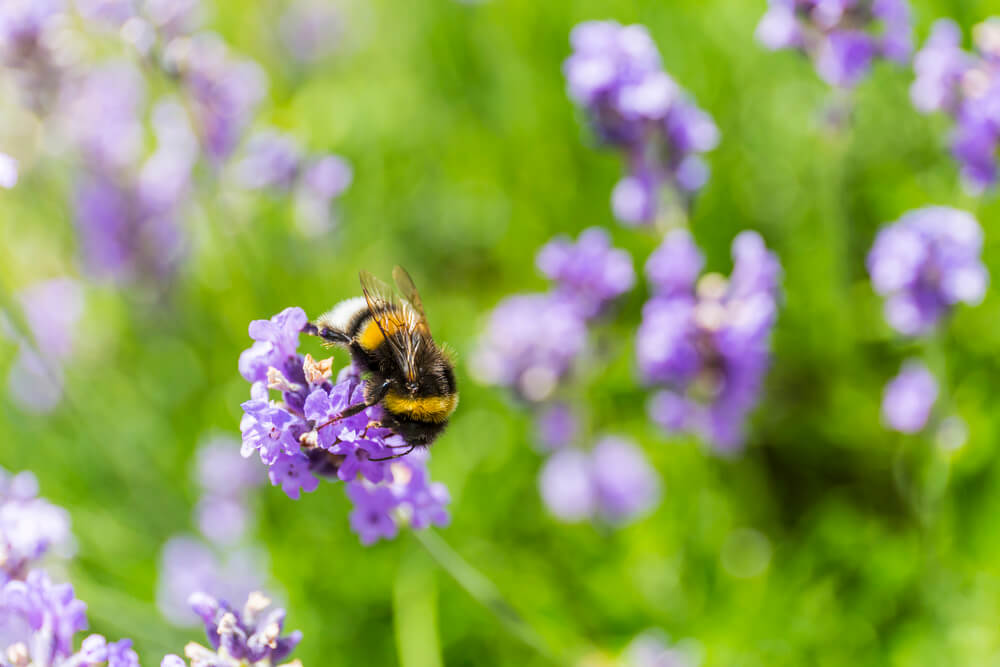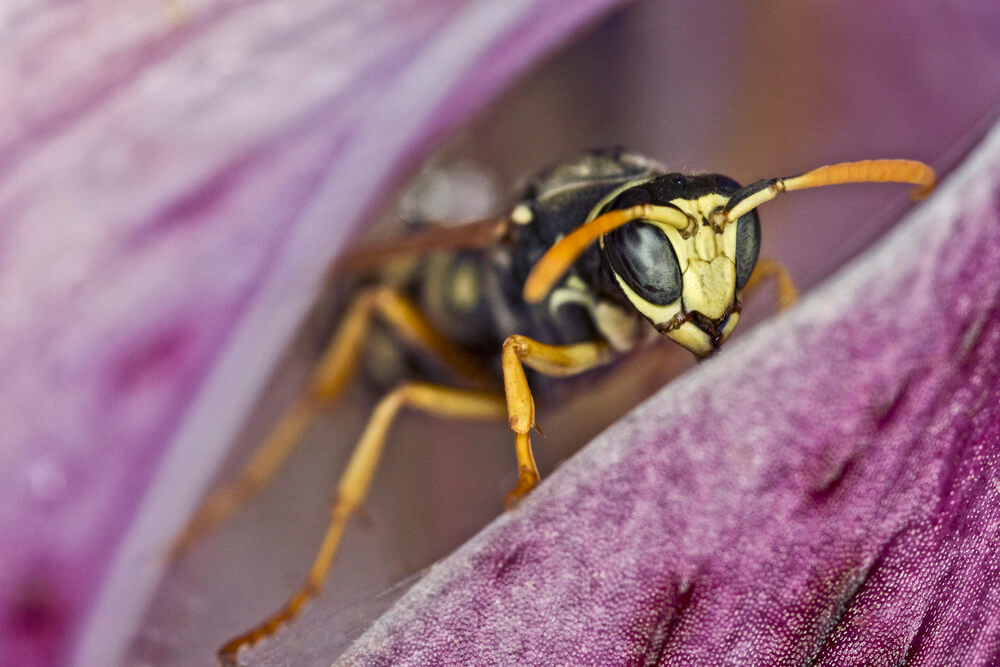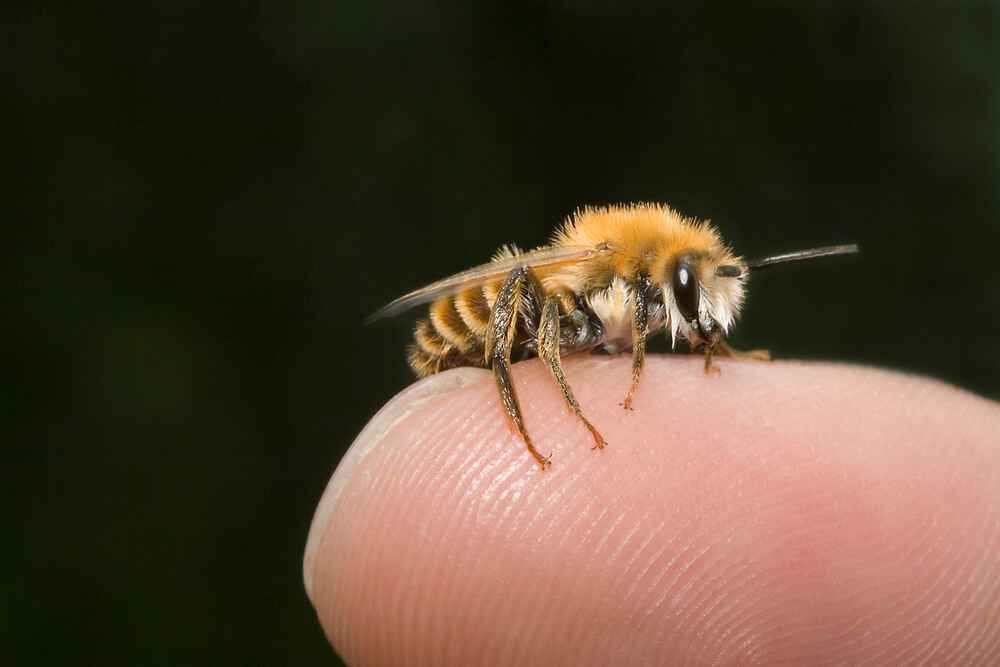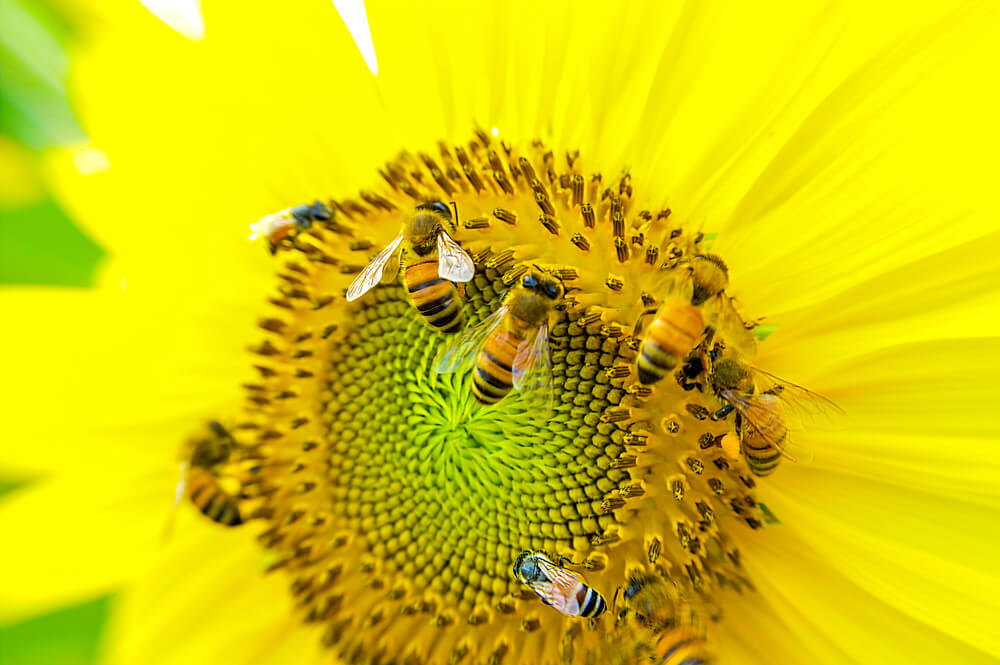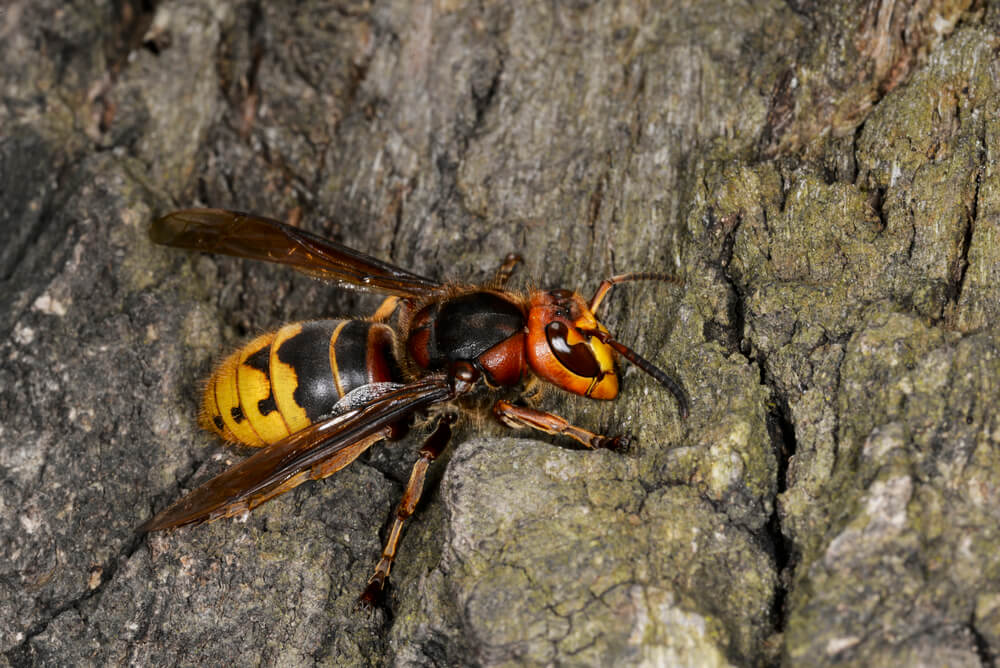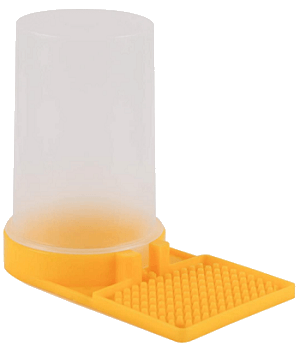Table of Contents:
Which Bumblebee Feeder is Best?
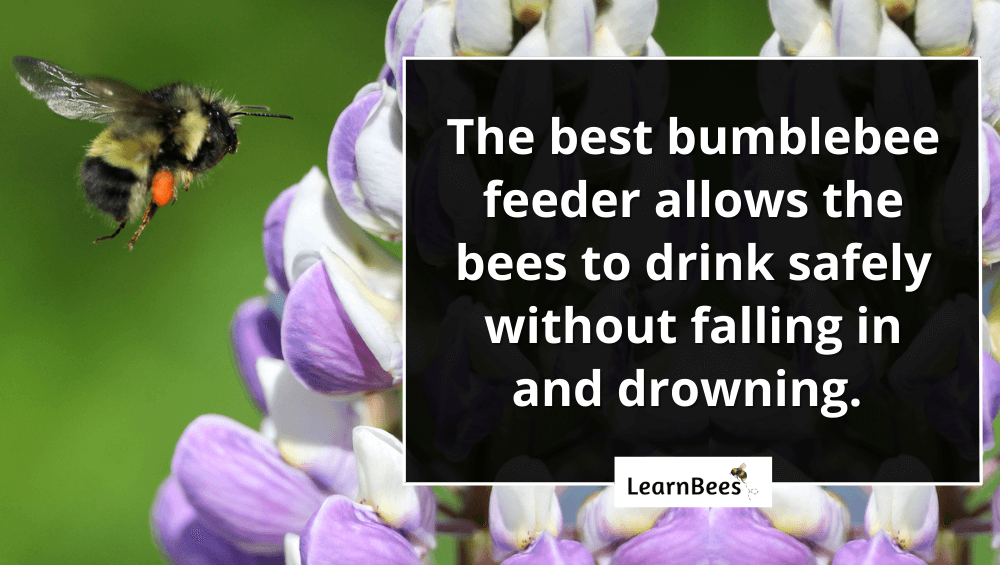
If there’s one thing you should know about bees, it’s this:
They can’t swim.
So your local bees will need a bumblebee feeder with safe places to perch on, so they don’t accidentally fall in and drown.
This is why, for example, you don’t place out large bowls of sugar water for bees. That will lead to drowned bees and other insects floating around in the bowl.
So how do you prevent bumblebees from drowning in the feeder?
Simple.
The easiest way is to fill a shallow bowl with clean marbles, crystals, or rocks. These objects should be above the water level to act as ‘landing perches’ for the bumblebees to rest on as they drink.
For example, here’s a honeybee using a rock as a safe landing perch to drink:
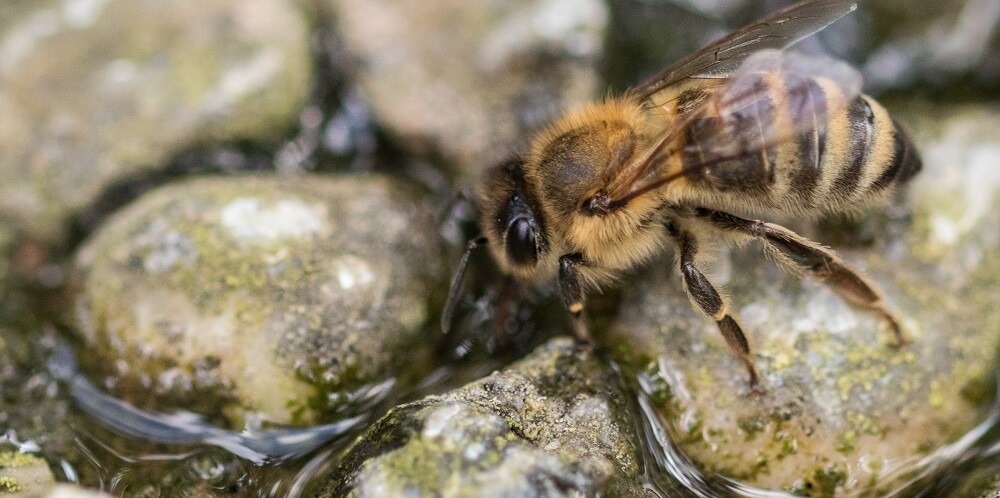
You can also use pre-made bee feeders to make things easy.
Bee feeders are shallow enough for the bumblebees to drink from safely. Fill them with sugar water, and you’re good to go.
Just remember to change the sugar water every two days once temperatures are above 80°F. This includes washing it in hot soapy water to sanitize it. If temperatures rise above 90°F, then change the sugar water daily.
But here’s the important thing to remember:
The bees won’t touch your bumblebee feeders if there are plenty of blooming flowers in the area. Bees only use sugar water as a last resort when nectar sources are scarce.
For instance, during the heat of the summer, flowers start to wilt if there is little rainfall. This is known as a nectar dearth.
The bad news?
Without flowers, bees and other valuable creatures wouldn’t survive. Bumblebees rely on nectar and pollen from blossoms. Nectar provides them with carbohydrates to give them energy. Pollen provides the bees with protein and other nutrients.
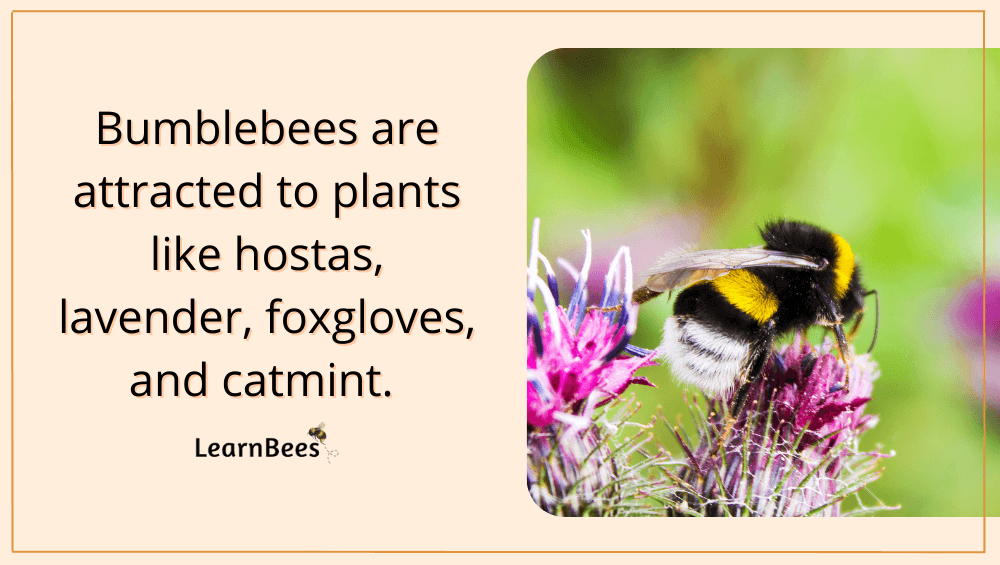
This is why it’s best to plant a bee-friendly garden with flowers that are drought tolerant. You’ll have dozens of happy bumblebees buzzing around your yard.
Here are a few flowers that bumblebees love during the summer:
So you might be wondering:
Is planting a pollinator garden better than providing a feeder for bumblebees?
Yes, planting a pollinator-friendly garden is the best thing you can do for your local bumblebees.
Sugar water is merely a substitute to a bee’s diet. That said, it doesn’t hurt to offer sugar water for your local bumblebees and other pollinators.
As mentioned, if the bumblebees need it, then they’ll drink it. If they don’t, then they won’t.
Sugar Water Recipe for Bumblebee Feeders
- Regular white sugar
- Water
- A bumblebee feeder
The recipe is simple. Mix one part sugar with one part hot water. This creates a 1:1 mixture of sugar and water.
To make this recipe, heat one cup of white sugar and one cup of water in a pot on the stove over medium heat. Heat the sugar water just enough until all the sugar dissolves. There’s no need to boil the sugar water.
Once the sugar is dissolved, allow the mixture to cool to room temperature before pouring it into your bumblebee feeders.
And keep in mind:
Never use brown sugar, molasses, or zero-calorie sweeteners when making sugar water for bumblebees. Anything other than regular white table sugar can harm bees.
When Do I Stop Feeding Bumblebees?
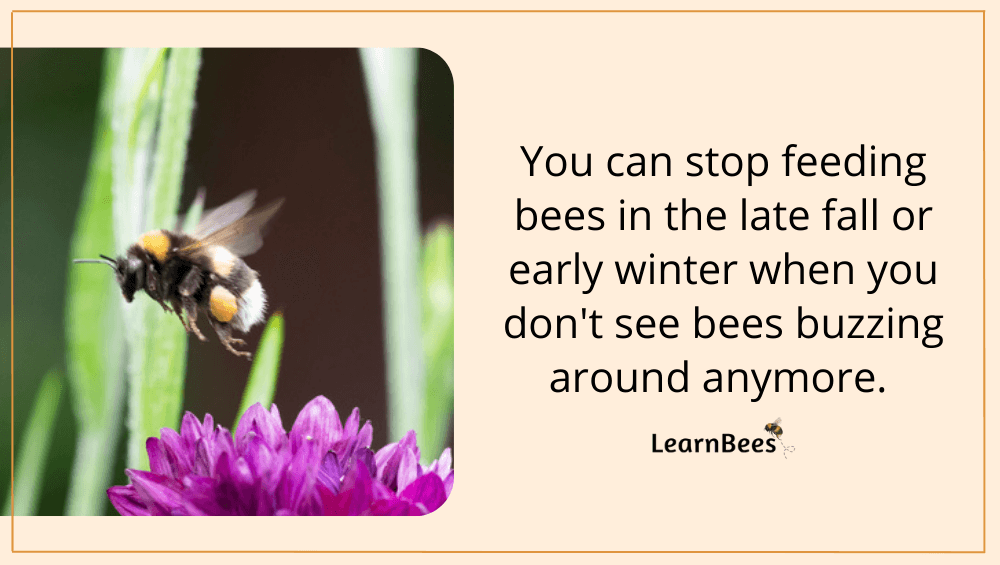
Like all bees, bumblebees are cold-blooded creatures that aren’t active during the winter. Their peak seasons are spring, summer, and early fall.
In fact:
The entire bumblebee colony dies off by late fall, leaving only the queen bumblebees behind to hibernate during the winter. As a result, you can remove your bumblebee feeders once winter arrives and you stop seeing bumblebees buzzing around.
But here’s something to consider:
Your bumblebee feeder won’t just get visits from bumblebees. You’ll also garner attention from honeybees, mason bees, ants, and even wasps.
This is normal.
But to prevent ants from taking over, you can sprinkle cinnamon around the feeder’s base. Avoid using chemicals like ant killers because you don’t want to harm the bees if they land on it accidentally.
With that said, if you’re using bumblebee feeders, you should also expect to get attention from other insects. But don’t worry because bees, wasps, and other insects are valuable parts of our ecosystem. It’s okay to feed them, too.
FAQs on Bumblebee Feeders
- How do you make a bumblebee feeder?
- Which feeder is best for bees?
- What do you put in a bumblebee feeder?
- Does sugar water attract bumblebees?
- Should I put sugar water out for bumblebees?
- Where do I put my bumblebee feeder?
- Do you need a bumblebee feeder?
- Is there such a thing as a bumblebee feeder?
- Can you overfeed bumblebees sugar water?
- What can I give bumblebees instead of sugar water?
- When should I start feeding bumblebees?
- When should I remove my bumblebee feeder?
- Can you feed bumblebees at night?
- Can you feed old honey to bumblebees?
- Are pollen patties good for bumblebees?
How do you make a bumblebee feeder?
“How do you feed a bumblebee?” is a common question we get asked.
The answer is simple: with sugar water. But before you start feeding bumblebees, there are a few things you need to know.
First, you need a bumblebee feeder. You can purchase a bumblebee feeder or make your own out of a shallow bowl. Just remember to put something in the bowl so the bees can land on it, like rocks, crystals, or marbles. These act as “landing pads” for the bees.
Next, you’ll need to make sugar water. To do this, mix one part sugar with one part hot water. This creates a 1:1 mixture of sugar and water. The sugar should dissolve over the stove on medium heat.
Remember:
Only use plain, white table sugar to feed bumblebees. Never use brown sugar, molasses, or any other type of sugar. Anything other than regular white table sugar can harm bees.
Once the sugar water has cooled, pour it into your bumblebee feeder and place it outside.
And that’s it. You’re now ready to start feeding bumblebees.
—> Go back to the FAQs on bumblebee feeders
More to Explore:
- Do Queen Bees Eat Honey?
- Are Worker Bees Male or Female?
- Queen Bee Versus Worker Bees – How Do They Compare?
Which feeder is best for bees?
The best feeder for bumblebees is one that they won’t drown in. Keep in mind that bees can’t swim, so they need places to land on so they don’t fall in the sugar water and drown. For example, landing perches can include marbles, crystals, and rocks.
Using a bowl or shallow birdbath, you can put together a DIY bumblebee feeder. Place the rocks in the bowl or birdbath and pour the sugar water over it. Ensure the rocks are above the water level so the bees can rest on them safely.
You can also buy a bee feeder online.
Just clean your bee feeder regularly and replace the sugar water mixture. Once temperatures are above 80°F, change the sugar water every two days. This includes washing your bee feeder to sanitize it. If temperatures rise above 90°F, then change the sugar water daily.
—> Go back to the FAQs on bumblebee feeders
More to Explore:
- Do Carpenter Bees Pollinate?
- How Long Do Bumble Bees Live?
- Honeybees vs. Bumblebees: How Do They Compare?
What do you put in a bumblebee feeder?
The only thing you need to put in a bumblebee feeder is sugar water.
To make sugar water, mix one part sugar with one part hot water. This creates a 1:1 mixture of sugar and water. The sugar will dissolve into the water on the stove over medium heat.
—> Go back to the FAQs on bumblebee feeders
More to Explore:
Does sugar water attract bumblebees?
Yes, sugar water does attract bumblebees during times of nectar dearth. A nectar dearth occurs when there is a lack of flowers for bees to feed from. This can happen during the winter or during periods of drought, such as the summer.
Bees are attracted to sugar water because it provides them with food and a quick energy source. The sugar water can help the bees survive during these difficult times.
Additionally, you’ll attract more than just bumblebees with your bumblebee feeder. Other bees, wasps, and ants will come to visit your feeder. This is not a bad thing. Simply be prepared for a variety of different visitors.
To deter ants, you can sprinkle cinnamon around the feeder. This is a better alternative than spraying ant killer. You don’t want harsh chemicals around your bee feeder because they could harm the bumblebees.
—> Go back to the FAQs on bumblebee feeders
More to Explore:
- Ground Bees: Are They a Threat to Your Yard?
- Wasps vs. Honeybees: Are They Different?
- Do Bumble Bees Bite?
Should I put sugar water out for bumblebees?
The best thing for bumblebees is to plant flowers they’re attracted to. Bees depend on pollen and nectar from flowers for food. By planting flowers, you provide a natural food source for bees.
If you want to attract bumblebees specifically, then plant flowers such as:
If you live in an urban area or don’t have a lot of flower space, then you can put out a bumblebee feeder with sugar water.
Bumblebees are essential pollinators and play a vital role in our ecosystem. You can help them survive during nectar dearths when flowers wilt by providing them with a food source.
—> Go back to the FAQs on bumblebee feeders
More to Explore:
Where do I put my bumblebee feeder?
The best place to put your bumblebee feeder is in a shady spot next to other flowers. The sugar water may evaporate quickly if it’s too hot and the bee feeder is placed in the sun.
—> Go back to the FAQs on bumblebee feeders
More to Explore:
Do you need a bumblebee feeder?
No, bumblebees have survived for ages without feeders. The best thing to do is plant a bee-friendly garden with various flowers. This will provide them with the natural food source they need.
Bumblebee feeders are more of a last resort for hungry bees struggling during times of nectar dearth. Nectar dearths occur when there are shortages of nectar-producing flowers.
If you want to put out a bumblebee feeder, then do so. Just remember to clean it regularly and replace the sugar water mixture. You don’t want to hurt the bees by giving them old, dirty sugar water.
—> Go back to the FAQs on bumblebee feeders
More to Explore:
Is there such a thing as a bumblebee feeder?
Most bee feeders on the market are geared towards honeybees. This is because beekeeping is a popular hobby that revolves around honeybees. That said, you can use the same feeders for bumblebees that you use for honeybees. They work the same.
—> Go back to the FAQs on bumblebee feeders
More to Explore:
Can you overfeed bumblebees sugar water?
No, bumblebees won’t overfeed on your feeders. In fact, if there are nectar-producing flowers available in your area, then the bumblebees won’t touch your feeders. They’ll only use the feeders when needed, such as during nectar dearths.
—> Go back to the FAQs on bumblebee feeders
More to Explore:
What can I give bumblebees instead of sugar water?
The best thing you can do for local bumblebees is to plant flowers they’re attracted to. A bumblebee’s diet depends on pollen and nectar from flowers. Bumblebees are attracted to plants like lavender, cat mint, hostas, and foxgloves.
—> Go back to the FAQs on bumblebee feeders
More to Explore:
When should I start feeding bumblebees?
Early spring since this is when queen bumblebees come out of hibernation. They’ll need food to help them build their nests and raise their young.
—> Go back to the FAQs on bumblebee feeders
More to Explore:
- What Do Bee Eggs Look Like?
- What Are Black Honeybees?
- Bees Color: 10+ Types of Colored Bees With Pictures
When should I remove my bumblebee feeder?
Once you see no bees buzzing around in the late fall to early winter.
—> Go back to the FAQs on bumblebee feeders
More to Explore:
Can you feed bumblebees at night?
Bumblebees aren’t actively pollinating flowers at night. Instead, they’re back inside their nests which explains why you don’t see bees out at night. So no, bumblebees won’t drink from the feeders a night.
—> Go back to the FAQs on bumblebee feeders
More to Explore:
Can you feed old honey to bumblebees?
No, honey from the grocery store or random sources should never be fed to bumblebees. The honey may be contaminated with infections or diseases from other beehives. As a result, this can harm your local bumblebees.
The best food source for bumblebees is a flower garden. By planting flowers, you provide them with the natural food source they need to survive. Bumblebee feeders can be used to supplement their diet when nectar sources are low.
—> Go back to the FAQs on bumblebee feeders
More to Explore:
Are pollen patties good for bumblebees?
Pollen patties are fine for bumblebees and other bee species like honeybees.
They’re generally supplied to supplement the nourishment of honeybee or bumblebee colonies during late winter or early spring.
